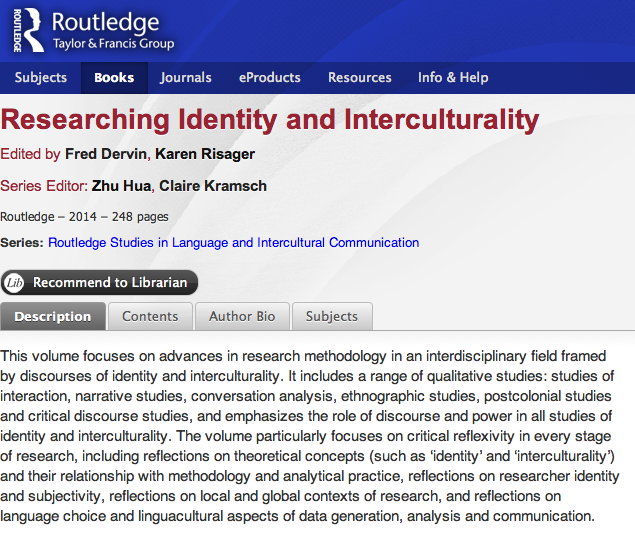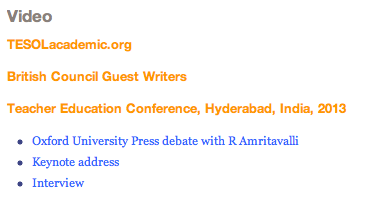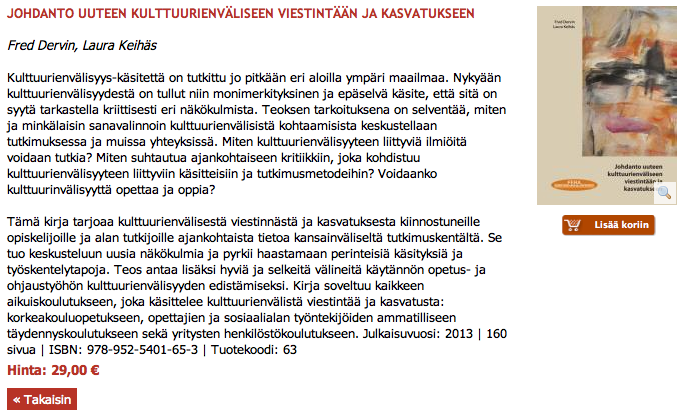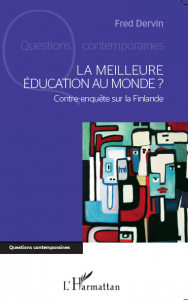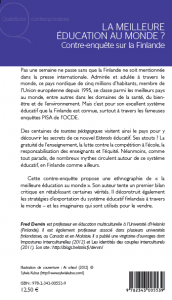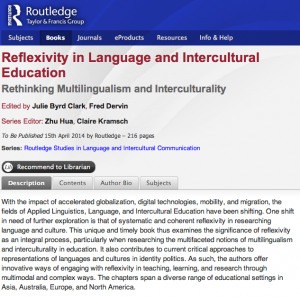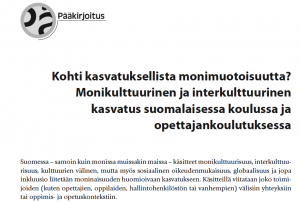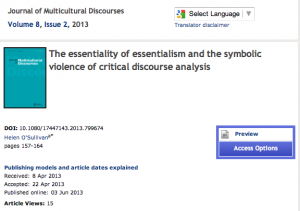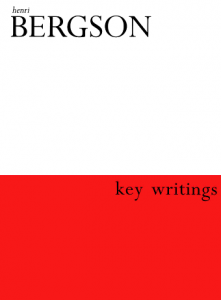Introduction Fred Dervin and Karen Risager Part 1: Critical Methodologies in Researching Identity and Interculturality Introduction Fred Dervin and Karen Risager 1. Identity, Intersubjectivity and Methodology Alex Gillespie 2. Postcolonial Processes of Subjectivity and Intercultural Identities in Development Practices Heidi Bojsen 3. Interculturality in Ethnographic Practice Lise Galal 4. Re-Asserting the Identities of Non-Western Discourses Shi-Xu Part 2: Researching Identity and Interculturality in Educational Settings Introduction Fred Dervin and Karen Risager 5. Exploring Identity Development in Advanced L2 Learners through Contextualized Repertoire and Discursive Stance Mary Kathyn Malone and Celeste Kinginger6. Ethnomethodological Methods for Identity and Cultural Matters Elizabeth Stokoe and Frederick Attenborough 7. Discursive Ethnography: A Microanalytical Perspective on the Establishment and Negotiation of Cultural Identities and Cultural Performance Louise TranekjærPart 3: Researching Identity and Interculturality in Migration Introduction Fred Dervin and Karen Risager 8. Interculturality: Reconceptualising Cultural Membership and Identities Zhu Hua 9. Identity: Brought About or Brought Along? Mike Baynham 10. Power Relations and Identity: Flexibility and Fixity in Identity Repertoires Anna De Fina Part 4: New Theoretical Concepts and Reflexivity in Researching Identity and Interculturality Introduction Fred Dervin and Karen Risager 11. Transgression Concepts as Analytical Tools Birgitta Frello 12. Identity vs. Subjectivity: Different Timescales, Different Methodologies Claire Kramsch
Videos (Adrian Holliday)
JOHDANTO UUTEEN KULTTUURIENVÄLISEEN VIESTINTÄÄN JA KASVATUKSEEN
New book on Finnish education (French)
New article: Politics of identification in student mobility
Forth. Byrd Clark/Dervin
CONTENTS
1. Introduction: Reflexivity in Applied Linguistics, Language and Intercultural Education Julie Byrd Clark and Fred Dervin 2. Relations of power in critical reflexive ethnography: Issues related to researching Official language instruction in Ottawa, Ontario, Canada Sylvie Lamoureux 3. Multimodal democracy in action: Reflexivity and critical language education in Occupy L.A. Christian W. Chun 4. Questioning reflexivity in multilingual and intercultural research: What research participants don’t tell the researcher and vice versa Prue Holmes 5. Reflexivity and Self-Presentation in Intercultural Encounters: Making Sense of Self and Other in a European Student Association Alex Frame 6. Weaving a method: Mobility, the senses and multiple locations as foci of research on intercultural language learning Ulrike Najar 7. “Or, just it’s my fault right?” : Language socialization and reflexivity through L2 writing feedback Jérémie Séror 8. Creating a digital text with high school dropouts in Paris, France: Reflexivity through ethnographic participant observation Eric Chauvier 9. Everyday practices, everyday pedagogies: a dialogue on critical transformations in a multilingual HK school Miguel Pérez-Milans and Carlos Soto 10. The process of becoming reflexive and intercultural: Navigating study abroad and reentry experience Jane Jackson 11. Looking Back, Crossing Boundaries, and Moving Forward: Reflexivity in Motion in Language and Literacy Learning Mark Evan Nelson and David Malinowski, Discussant Claire Kramsch 12. Conclusion Fred Dervin and Julie Byrd Clark
Read Introduction to journal issue (in Finnish)
New Book Series: Nordic Studies on Diversity in Education
Title: Nordic Studies on Diversity in Education
Series editors: Fred Dervin, Lars Anders Kulbrandstad and Hanna Ragnarsdóttir
Publisher: Cambridge Scholars
Like the rest of the world, the Nordic countries have become more heterogeneous than ever before. This means that Nordic educational institutions have increasing diversity in terms of origins, languages, religions/worldviews but also socio-cultural background of the different actors involved (staff, parents and students). It is well known across the world that these countries are based on a common set of fundamental values such as democracy, social justice and inclusion. Yet when it comes to the treatment of diversity, especially in education, many issues remain unresolved…

